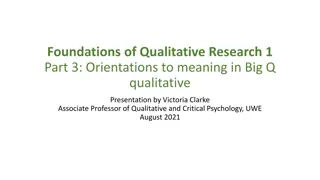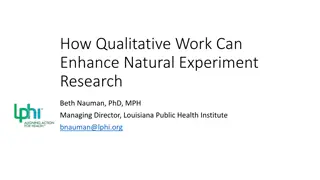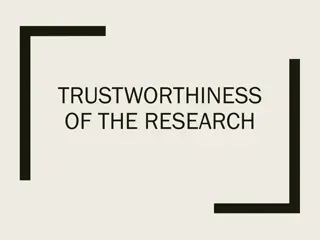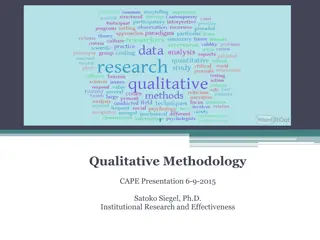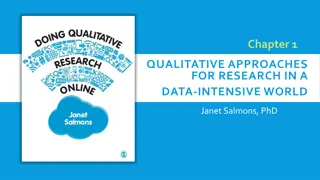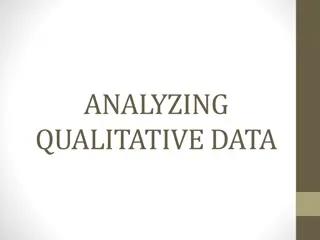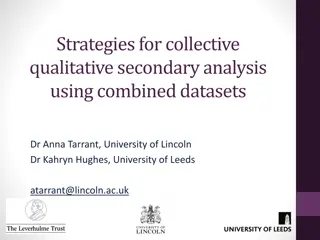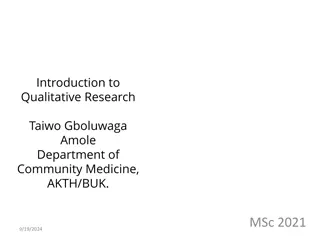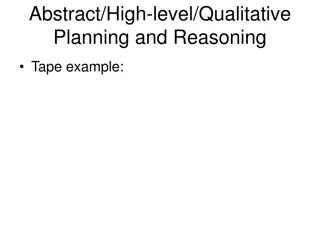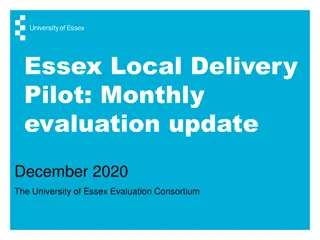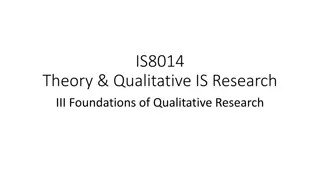Actions Emanating from the Evaluation of the Governance Reform
The evaluation of the governance reform within the WMO aimed to assess its alignment with strategic objectives, effectiveness in responding to societal needs, coordination efficiency, decision-making process, agility, and more. Evaluation criteria included relevance, design validity, effectiveness,
1 views • 13 slides
Understanding Quantitative and Qualitative Research Methods
Exploring the differences between quantitative and qualitative research methods, this content delves into the importance of qualitative research, various methodologies such as focus groups and interviews, data collection, research ethics, and analysis techniques. It also covers the elements of the r
4 views • 43 slides
Universal Evaluation Framework: Simplifying Evaluation Processes
This session introduces the Universal Evaluation Framework (UEF) developed for evaluating QAA Scotland Enhancement Themes. Participants learn key evaluation questions, evidence capture, and the Theory of Change to enhance evaluation confidence. The QAA Scotland Evaluation Odyssey details historical
2 views • 14 slides
Implementing Blind Evaluation Pilot in HORIZON EUROPE: Key Facts and Process
HORIZON EUROPE is conducting a pilot on Blind Evaluation in the 2023-2024 work program to address biases in the research and innovation evaluation process. The pilot aims to assess the feasibility of blind evaluations in ensuring fairness and mitigating potential biases towards well-known organizati
9 views • 9 slides
Understanding Qualitative Research: Foundations and Orientations
Explore the foundations of qualitative research and orientations to meaning in Big Q qualitative methods. Delve into the values, characteristics, and theoretical underpinnings of qualitative inquiry, and reflect on the significance of meaning-making in research. Consider the role of subjectivity in
0 views • 23 slides
Understanding the Case Study Method: In-depth Qualitative Analysis
The case study method is a popular form of qualitative analysis involving intensive observation of a social unit. It focuses on detailed analysis of a limited number of events or conditions to understand complex interrelationships. Characteristics include intensive study of a single unit, qualitativ
1 views • 8 slides
Enhancing Natural Experiment Research Through Qualitative Work
Qualitative research plays a crucial role in enhancing natural experiment studies by providing insights into the processes of exposure to interventions, identifying variables influencing exposure likelihood, and determining suitable control groups. Complementary methods within the RE-AIM framework a
0 views • 13 slides
Qualitative Data Analysis Techniques in Research
The purpose of data analysis is to organize, structure, and derive meaning from research data. Qualitative analysis involves insight, creativity, and hard work. Researchers play a crucial role as instruments for data analysis, exploring and reflecting on interview discussions. Steps include transcri
1 views • 27 slides
Using Qualitative Methods in Quality Improvement Projects
Qualitative methods offer valuable insights in quality improvement projects by capturing non-numerical information like experiences, thoughts, and perspectives. They help to understand patient and staff perspectives, challenges, and successes in QI initiatives. Utilizing techniques such as interview
1 views • 21 slides
Understanding Experiential vs. Critical Qualitative Research
Delve into the foundations of qualitative research with a focus on experiential and critical approaches. Explore key concepts, defining characteristics, and theoretical foundations, distinguishing between qualitative and quantitative research. Reflect on different orientations, subjectivity, and ref
0 views • 16 slides
Exploring Key Characteristics of Qualitative Research in Psychology
The lecture series delves into the values, characteristics, and theoretical foundations of qualitative research, emphasizing the differences from quantitative methods. It explores experiential and critical qualitative camps, subjectivity, reflexivity, and ontological and epistemological foundations.
4 views • 18 slides
Ensuring Trustworthiness in Qualitative Research Studies
Trustworthiness in qualitative research is essential for establishing confidence in the study outcomes. Guba's four criteria - credibility, transferability, dependability, and confirmability - provide a framework for achieving trustworthiness. Strategies such as adopting reliable research methods, u
3 views • 10 slides
Understanding NVivo: A Brief Introduction to Qualitative Data Analysis Software
Explore the world of NVivo with Dr. Will Fassbender, an Assistant Professor at Montana State University. Gain insights into qualitative data analysis, download procedures, basic functions, and more. Join this introductory session to discover how NVivo can streamline your research process and aid in
0 views • 16 slides
Enhancing Evaluation Capabilities in Mongolia for Agenda 2030
The Mongolian Evaluation Network in collaboration with UNDP is working to integrate the 2030 Agenda into national strategies and plans, establish institutional coordination mechanisms, align budgets, and enhance data monitoring systems. Key stakeholders including government agencies, NGOs, and inter
0 views • 9 slides
Contrasting Qualitative and Quantitative Traits in Genetics
Genetic traits in organisms can be qualitative or quantitative, with qualitative traits controlled by single genes and showing distinct variations, while quantitative traits are influenced by multiple genes and environmental factors, resulting in continuous variations. Qualitative genetics focuses o
0 views • 13 slides
Qualitative Analysis of Aldehydes and Ketones in Chemistry Lab
In this Chemistry 318 lab, students will conduct qualitative analysis of aldehydes and ketones using chemical and spectroscopic methods. The lab includes classification tests, spectroscopy (IR, 1H-NMR/13C-NMR, MS), and identification of unknown compounds. Experimental procedures involve physical eva
1 views • 11 slides
Understanding Evaluation in Education
Evaluation in education is a comprehensive term that encompasses measurement, testing, and qualitative examination of student behavior. It involves both quantitative and qualitative descriptions, along with value judgments. Differentiating from mere measurement, evaluation provides a deeper analysis
0 views • 28 slides
Understanding Quantitative Genetics Principles in Animal Breeding
Quantitative genetics focuses on the inheritance of characteristics based on degree rather than kind, compared to qualitative genetics. It involves polygenes controlling quantitative traits, which exhibit continuous variation and can be measured using metric units. Qualitative traits, on the other h
0 views • 22 slides
Sustainable Evaluation Systems Workshop Summary
Workshop on Sustainable Evaluation Systems by Stephen Porter at the NEC Conference focused on defining evaluation systems, addressing their failures, and emphasizing the importance of quality, use, and networks in achieving sustainability. Participants engaged in activities such as bingo card introd
0 views • 38 slides
Understanding Qualitative Methodology: An Overview
This presentation delves into the realm of qualitative methodology, exploring its purpose, characteristics, approaches, data collection methods, analysis, and learning outcomes. It aims to provide a deep understanding of how qualitative research illuminates voices and experiences, distinguishes betw
0 views • 41 slides
Qualitative Approaches in a Data-Intensive World
Qualitative research involves studying perceptions, experiences, and behaviors through verbal or visual expressions. In a data-intensive world, online communication plays a crucial role in data collection. Qualitative eResearch utilizes Information and Communication Technologies (ICTs) strategically
0 views • 10 slides
Meaning and Meaning-making in Big Q Qualitative Research
Qualitative research explores different understandings of meaning and meaning-making, providing researchers with tools, techniques, and values. Big Q qualitative research focuses on the active role of words in creating meaning beyond reflecting experiences. This lecture series delves into the founda
1 views • 20 slides
Impact and Evaluation Toolkit for Churches and Christian Charities
This toolkit aims to equip churches and Christian charities engaged in small-scale social action projects to think about impact, measure impact, choose data tools, reflect on evaluation data, and use it effectively. It covers principles of evaluation, setting objectives, selecting indicators, storyt
0 views • 34 slides
Overview of Monitoring and Evaluation in the GEF
The Evaluation in the GEF and Training Module focuses on promoting accountability and learning within the Global Environment Facility (GEF) through monitoring and evaluation activities. The GEF Independent Evaluation Office plays a crucial role in assessing results, effectiveness, and performance of
0 views • 25 slides
Analyzing Qualitative Data: Steps and Coding Methods
Understanding qualitative data analysis involves several key steps, such as preparing the data through transcription, developing codes and categories using content analysis, revising categories based on the data, and reporting the analysis results. Content analysis helps in identifying words, themes
0 views • 32 slides
Design Philosophy for Increasing Accessibility in Qualitative Data Analysis Software
Growing interest in qualitative research methods has led to increased use of Qualitative Data Analysis Software (QDAS). However, challenges remain in making these tools accessible and easy to use, especially in educational settings. This article explores design philosophies to enhance accessibility
0 views • 16 slides
Analyzing U.S. Higher Education Success Metrics: A Qualitative Perspective
Delve into the nuances of U.S. higher education success metrics through a qualitative analysis, exploring the classification of qualitative successes in quantitative datasets and the factors influencing accurate or inaccurate classifications. The study involves individuals who attended community col
0 views • 18 slides
Developing an Evaluation Work Plan for Effective Program Assessment
This presentation by Amy D. Andrade from San Jose State University focuses on developing an Evaluation Work Plan to identify responsibilities and timelines. It covers topics such as Evaluation Coaching Support, Webinar Outlines, Logic Model, Inputs-Outputs-Outcomes, Two Approaches to Evaluation, Pro
0 views • 29 slides
Perceived Risks and Risks Mitigation Practices in Informal Waste Workers: A Qualitative Study
A qualitative study conducted in Kathmandu Valley exploring the perceived risks and mitigation practices of informal waste workers. The research project, led by Sujata Sapkota, aims to address the occupational and health challenges faced by these workers. The study includes a mix of quantitative and
0 views • 22 slides
Strategies for Collective Qualitative Secondary Analysis Using Combined Datasets
Collective qualitative secondary analysis involves reusing data through a collaborative lens, embracing multiple viewpoints to gain deeper insights. The approach emphasizes the constructed nature of research data and allows for diverse interpretations and engagements. This article discusses the proc
0 views • 15 slides
Understanding Research Methods in Public Health
Exploring the nuances of qualitative and quantitative research methods in the context of public health, this content delves into how each approach offers unique insights and perspectives. It discusses the importance of qualitative research in uncovering underlying factors influencing health, interpr
0 views • 77 slides
Qualitative Approach in Cognitive Interview Data Analysis
Understanding the importance of a qualitative approach in analyzing cognitive interview data is crucial for uncovering patterns and recurring themes. This involves delving deeper into the why behind the responses rather than just naming and classifying data. Using methods like standardised coding sc
0 views • 18 slides
Evaluation Synthesis in Changing Contexts: Enhancing Knowledge for Development Effectiveness
Evaluation synthesis is crucial for promoting learning, reflection, and decision-making in development work. This process involves bringing together diverse knowledge sources to generate strategic insights and facilitate wider use of evaluation findings. The Independent Office of Evaluation of IFAD
0 views • 20 slides
Creative Problem Solving through High-level Qualitative Planning and Reasoning
Explore the world of abstract and high-level qualitative planning through examples like MacGyver's inventive solutions, opening jar tricks, and audience participation in problem-solving. Witness how qualitative reasoning can lead to innovative solutions in various scenarios.
0 views • 15 slides
Evaluation of FME Zero Emission Neighbourhoods in Smart Cities
The mid-term evaluation process of FME Zero Emission Neighbourhoods in Smart Cities involves self-evaluation, partner evaluation, and panel evaluation. The procedure includes scientific review, evaluation by scholars, and innovation assessment. Key documents like self-reports, progress reports, and
1 views • 20 slides
Overview of Regular Evaluation 2017 Findings in Estonia
In the Regular Evaluation 2017, efforts were made to maximize the benefits of evaluation outcomes for various stakeholders in Estonia such as the state, society, and institutions. The evaluation focused on a range of actions including preparing legislation, finding experts, creating self-report form
0 views • 6 slides
Understanding Qualitative Data in Counseling
Exploring the challenges and strategies in utilizing qualitative data in counseling, this discussion covers topics such as data collection, coding for meaning, and presenting qualitative evidence. The importance of qualitative data in improving counseling programs and student services is highlighted
0 views • 32 slides
Comprehensive Guide to Training Evaluation Methods
This detailed guide covers the aim of evaluation, evaluation methods, techniques of evaluation, types of evaluation (formative, process, outcome, impact), and the significance of formative and process evaluation in assessing training effectiveness. Learn about the key principles and practices involv
0 views • 45 slides
December 2020 Essex Local Delivery Pilot Monthly Evaluation Update
The December 2020 update of the Essex Local Delivery Pilot's monthly evaluation includes actions from the previous month, process evaluation details, population information, test and learn strategies, learning and development insights, recommendations, and further information. Key evaluation activit
0 views • 30 slides
Foundations of Qualitative Research: Understanding Methods and Data
Qualitative research involves a mix of different methods drawing on qualitative data, with debates on the need for a sensitive approach for richer appreciation. Understanding qualitative data and context, along with various types of data such as interviews and user-generated content, is essential fo
0 views • 41 slides




